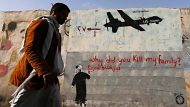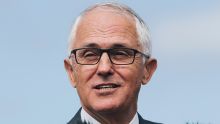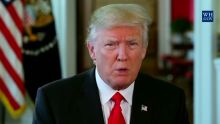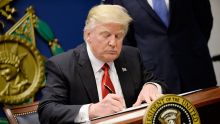Washington: This is the face of selective, lily-livered hate.
Donald Trump holds it in his heart, but he manufactures it too, masking state-sanctioned religious persecution as a national security endeavour – all to stoke the "us and them" hysteria that drove his election campaign.
More World News Videos
Trump travel ban sparks lawsuits, panic abroad
US President Donald Trump's executive order temporarily barring visitors from seven predominantly Muslim countries and banning Syrian refugees indefinitely will likely land his administration in court.
As Trump severed the torch-bearing arm from the Statue of Liberty and the US went dark overnight on Friday, American airport arrival halls and departure lounges around the world became settings for heartbreak, frustration and panic.
Accounts of the arrival at New York's John F Kennedy International Airport of Hameed Khalid Darweesh, an Iraqi, read like a bad Hollywood movie – despite working for the US in Iraq for a decade, for which he was targeted twice, Hameed was detained but his wife and children were allowed in; his lawyer was not allowed to see him; and when the lawyer asked who did he need to contact, he was told by a border agent: "Call Mr Trump."
Seyed Soheil Saeedi Saravi, by all accounts a brilliant young scientist from Iran, was due to travel to Boston to take up a fellowship to study cardiovascular medicine at Harvard – but his and his wife's visas were suspended indefinitely.
A Syrian refugee family of six, who have been living in a Turkish refugee camp since fleeing the living hell of the Syrian civil war in 2014, had been granted visas and were to arrive in Cleveland on Tuesday – their travel was cancelled.
In Cairo, a group of young Arabs – five Iraqis, one Yemeni – all with valid immigration papers, were about to board an EgyptAir flight to New York when they were told they could not.
In Istanbul, security officers boarded an aircraft that was set for takeoff to the US and removed a young Iranian woman and her family.
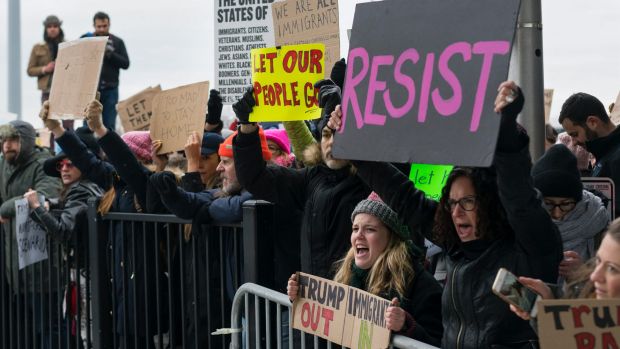
Trump's sinister choice of blacklisted countries
The new President is cravenly political in the countries he decided to put on a refugee and migrant blacklist. And his inclusions and exclusions don't make sense – unless your name is Donald Trump.
Trump claims to be motivated by the horrific September 11 attacks on New York and Washington, but the countries of which the 19 aircraft hijackers were citizens are not on the list – most came from Saudi Arabia and the rest from the United Arab Emirates, Egypt and Lebanon.

Also absurdly absent are Pakistan, Turkey and Afghanistan – all of them hotbeds of terror. In excluding them, Trump is grovelling to their leaders, not making a gesture to their people.
But there's something a bit more sinister in his choice of targets.
This is a core identity of ours that we are repudiating in a very callous fashion. What do we do — get a new inscription on the Statue of Liberty?
Former US ambassador Ryan Crocker
In the 40 years to 2015, not a single American was killed on US soil by citizens from any of the seven countries targeted - Iran, Iraq, Libya, Somalia, Sudan, Syria and Yemen - according to research by the conservative-leaning Cato Institute.
But the same research shows that in the same period nearly 3000 Americans were killed by citizens of Saudi Arabia, the UAE, Egypt and Turkey — most victims of the September 11 attacks.

And oops, wouldn't you know it, Trump has multimillion-dollar business operations in all those countries.
In 2015, he registered eight hotel-related companies in Saudi Arabia, according to The Washington Post; in Turkey, two luxury towers in Istanbul are licensed to use his name; in Egypt, he has two companies; and in the UAE, he has naming and management deals for two golf courses.

Trump's insistence that immigrant vetting must be "extreme" deliberately misrepresents the previous regime as something of a cakewalk.
It was extreme and demeaning for a good number of Muslims, especially for refugees whose lives and connections were picked over for as long three years by the Department of Homeland Security, the FBI, the Department of Defence, the State Department, the National Counterterrorism Centre, and various other US intelligence agencies.
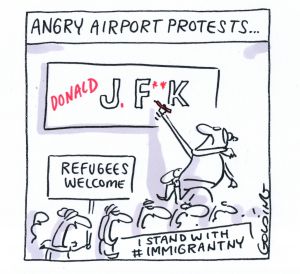
And he lies about the fate of Christians seeking entry to the US. "If you were a Muslim [in Syria] you could come in, but if you were a Christian, it was almost impossible," he said in a TV interview with the Christian Broadcasting Network on Thursday. "I thought it was very, very unfair. So we are going to help them."
In 2016, the US admitted Christian and Muslim refugees in similar numbers – 37,521 Christians and 38,901 Muslims, according to the Pew Research Centre. But given that the Middle East is overwhelmingly Muslim, the number of Muslims and Christians granted refuge from Syria and Iraq is much more likely to be about proportion than discrimination, as Trump has suggested.
And in singling out the plight of Christians as the victims of Islamic State, Trump is seemingly oblivious to, or just choosing to ignore, the fact that IS has murdered thousands of Muslims around the world.
Trump's recent predecessors, Barack Obama and George W. Bush, consistently refused to disparage all Muslims for the terrorism of a few who have perverted the religion. That Trump appears to be enjoying himself is not surprising, given that the man he has appointed as his national security adviser, Michael Flynn, argues that Islam - not terrorism - is a cancer.
Global condemnation
No surprise, then, that this rush of blood to Trump's head is being badly received – in the Muslim world and by those who are experts in international relations and other fields.
David Miliband, a former British foreign secretary and head of the International Rescue Committee, decried Trump's orders as "a repudiation of fundamental American values, an abandonment of the US' role as a humanitarian leader and, far from protecting the country from extremism, a propaganda gift to those who would plot harm to America".
"I think this is going to alienate the whole Muslim world," Mouwaffaq al-Rubaie, a former Iraqi national security adviser, told The New York Times.
When people showed up to airports to protest your owner's xenophobic, unconstitutional #MuslimBan https://t.co/vLMSUdGdlW
— Jill Biden (@JillBidenVeep) January 29, 2017
Ryan Crocker, a former US ambassador who served in five Muslim-majority countries, including Iraq and Afghanistan, under various administrations, took exception to Trump's executive order - which was publicly signed at the Pentagon - on several counts.
"This is a core identity of ours that we are repudiating in a very callous fashion. What do we do — get a new inscription on the Statue of Liberty? The Islamic State says it is leading the war against the US," he said. "Now it only has to pump out our press releases to prove that."
He was especially indignant on the plight of the thousands of Iraqis and Afghans who had risked their lives by working with the Americans after their countries were invaded by US-led coalitions – and of the likely reluctance of foreigners to work for the US in future conflict zones.
From refugee to #Marine. @USMC Cpl Ali J. Mohammed takes the fight to the doorstep of those who cast his family out.https://t.co/oSXWGrzsL7 pic.twitter.com/UVlWsaESic
— U.S. Dept of Defense (@DeptofDefense) January 25, 2017
"We are effectively saying to past, current and potential future interpreters, that we want them to work with us and risk their lives in the field — confident in the knowledge that they will be hung out to dry."
A reality that Trump ignores, and which all the high-IQ figures he boasts of in his cabinet are allowing him to get away with, is this: the chance of an American being killed by a refugee is one in 3.64 billion, infinitely greater than being struck by lightning not once, but twice.



